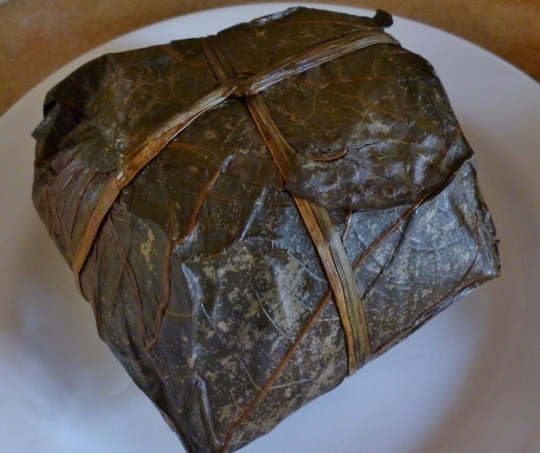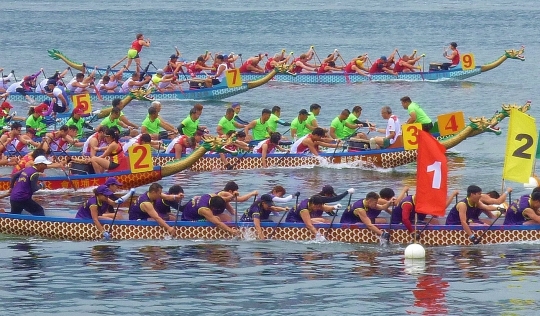In Hong Kong we know summer’s arrived when clothing sticks and dragons emerge, not real ones obviously but those wooden versions intended for the dragon boat festival. The saying, Don’t put your winter clothes away until it’s time to eat rice dumplings, a festive food, spells it out and you must admit, date considered, it bears an uncanny similarity to that British expression: Ne’er cast a clout till May be out. So strip off, grab a paddle and let’s race!Although minor tournaments are held throughout the year, most keen dragon boaters will have their eye on two particular events. The first is to celebrate the traditional Chinese festival held throughout the territory and the second, a few days later, is an international event in Victoria Harbour where local teams are challenged by squads from across the world. This international gathering, now in its 43rd running, has probably achieved the most in promoting dragon boating as a major participation sport worldwide, even in my hometown of Nottingham (UK) we’ve the Notts Anaconda Dragon Boat Club who fly the flag. You probably have a local team too; why not find out who they are?
As with all good Chinese festivals, tales and traditions abound and dragon boating is no exception. In this case the origins are said to extend way back to the third century BC, China’s Warring States period and the Kingdom of Chu.
It is written that a much respected Chinese poet and serving Minister of State by the name of Qu Yuan (Wat Yuen in Cantonese) had grown increasingly vexed by the corrupt practices of the Emperor King Hui’s imperial government. Having suggested reforms to combat such under-handedness, Qu Yuan instead found himself accused of treason by the government and banished to the countryside forever. Resigned to his rural exile, and with time to spare, Qu Yuan crafted elegant but bold poetry expressing concerns for his Chu homeland and people. But on hearing of an invasion by a rival state Qu Yuan despairingly scribed his final verse and, committing the ultimate protest, threw himself weighted with rocks into the Mi Luo River in Hunan Province.
Legend further relates that on hearing of this suicide, a number of fishing boats charged rapidly to the scene but to no avail. Consequently, to repel evil spirits the fishermen beat their drums, splashed water and scattered rice offerings to entice feeding fish away from the poet’s remains. One night however, the spirit of Qu Yuan appeared before the villagers to complain; such rice offerings, he declared, were being devoured by the river dragon. So to fend off this ravenous creature the apparition requested future offerings be wrapped in three-cornered silk packages, to which the fisherfolk willingly obliged.

Of course this is all a bit fanciful but thus grew the tradition of festive rice dumplings, the dragon boater’s staple; nowadays the dumplings comprise glutinous rice with meat or vegetable filling but gone is the silk wrapping, cheap bamboo leaves are used instead. And delicious they are too, give one a try! The dragon boat event therefore, fuelled by such festive dumplings, is intended to recreate faithfully the fisherman’s desperate charge of over 2,000 years ago. Held annually to commemorate the poet’s death, the ritual occurs on the fifth day of the fifth month of the lunar calendar, which equates to sometime in May or June.
Even before the demise of Qu Yuan, the period of the fifth moon was considered potentially ominous, a time when the dragon, ruler of rain and water, was reckoned to be most powerful. In spring, farmers would plant rice in readiness for the wet season and its fiercely hot and pestiferous climate; consequently, to appease the dragon and ensure adequate rainfall for a bountiful, disease-free crop, offerings would be made. And paddling a crude wooden vessel upon its watery habitat would do the job nicely.
Associated with virility and good health, it’s considered a great honour to crew a dragon boat especially within the close confines of those communities remaining fiercely traditional in approach. Nowadays of course one can choose to either race for the sporting thrill or, going a little deeper culturally, appease that watery dragon; or do both perhaps.
My induction to this fascinating tradition came in 1995 via the work place; I’d been seconded to a local power station that happened to run a team as part of their recreational facility. Whereas in Britain a factory or works might typically boast a football or cricket eleven, to me it made perfect sense that this should translate to a dragon boat team in Hong Kong.
And so it is with any organisation that can muster a crew: corporations, factories, colleges, charities, institutions, housing estates, fishing villages or any band of keen enthusiasts. They all assemble for battle on the festival day, some, having rigorously trained all year, others, never having sat in a boat before; for these, with victory way out of reach, it’s more about having fun and marking the day.
We fell into the more serious category, having our own boat and being able to practise a few nights a week after work. And a welcoming bunch of people they were too, I could not have asked for better though it felt odd at first being the only foreigner. The whole thing was so unlike anything I’d ever done before, being reluctant to join any group activity in school, college or early adult life, but here at 37 my subconscious was egging me on and I’m glad it did! Yes the practise sessions were tiring but I think it did us all some good and I have to say that paddling a dragon boat on the South China Sea seemed the perfect way to keep fit!
Tradition dictates that months before the big day, the dragon’s carved wooden head must be awakened from the temple where it has snoozed away the previous year; it should then be cleaned and re-painted in time for a ceremony presided over by a Taoist priest. Candles and incense are thus presented in worship to ensure good luck and fortune in races to come but, more importantly, the dragon’s eyes will be meaningfully dotted. Anxiously pondered for that ideal dotting day therefore, will be the Chinese Farmer’s Almanac, the bible advising bad and unlucky dates for every conceivable activity from demolishing a building to moving a bed.
Falling somewhat short of the romance inherent in such tradition, our dragon had gathered considerable dust while wintering on a storeroom shelf. But it came alive during our launching ceremony one auspicious March afternoon with earnest worship to ensure the good health and luck of the team. No high priest for us sadly so the station manager dotted eyes accordingly; cue optimistic celebration, enthusiastic drum rolls accompanied by the burning of lucky money. And, as the monetary embers faded, a feast of the customary roast pig with lashings of beer ensued. To accommodate the team’s offerings a makeshift altar had been erected so each member, equipped with three glowing incense sticks, could bow three times before planting said items in a sand filled urn.
Worship complete, the occasion continued with the boat launching. Once again, tradition dictated procedure, from a local temple, the dragon should be paddled directly out to sea, about turn, and, with drum beating loudly, return vigorously in the same direction. This exhibition run, if repeated three times towards the same temple, would assure good fortune, hopefully for the fishing communities where livelihood is so dependent on the mood of the sea. For us, with not a temple in sight, the less-mystical power station pontoon had to do.
And that was that. Several weeks of strenuous training were painfully completed before the big day arrived. And what a day too! Noise and colour dominated as fire crackers, lion dances, flags and throngs of spectators lined the 500-metre course.
The number of race categories that can be entered is impressively varied and depends on ones chosen size of dragon (small or standard with 10 and 20 paddlers respectively), gender and from where in the organisational world your team should hail. Each race generally comprises eight boats and each category winner determined over a series of qualifying heats, semis and finals. Even though a race might only last three minutes it takes the entire morning to complete the race programme.
Over the several years in which I participated we had mixed results and some of the most enjoyable moments of my life. The social aspect of a race day is also precious; meeting the same teams and the same faces again and again adds an impromptu party atmosphere. It’s over a decade ago now that I left that job and thereby the team, but I keep in touch and bump into them occasionally, they’re still paddling strongly incidentally, sometimes winners, sometimes not, but then it is the taking part which really matters. And of course, for health, happiness and fortune the dragon is appeased for yet another year. Hopefully I’ll have achieved similarly lofty ambitions by visiting water sanctified by so many lucky dragons. The team still look good by the way, happy and fit; so perhaps there really is something in it after all …
So do give it a try if you get the opportunity, especially if you find yourself in Asia where, entwined with all that tradition, the whole experience takes on a slightly spiritual veneer. This year’s events have just finished, but never mind, any takers for 2019?

